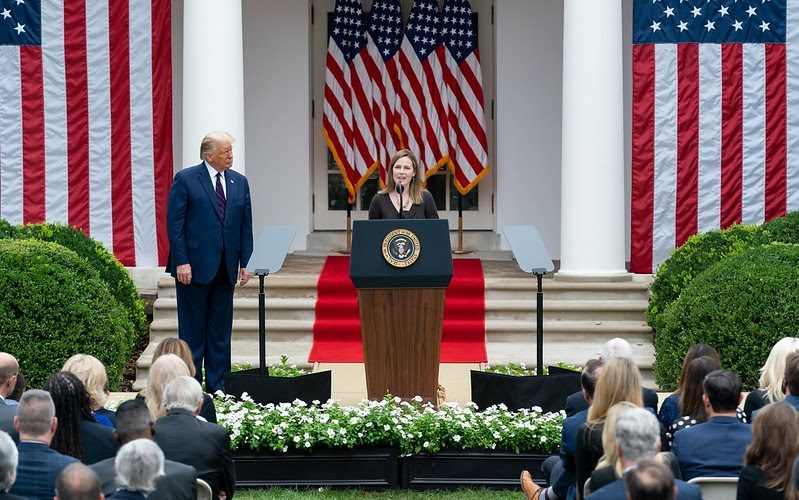Justice Amy Coney Barrett’s confirmation hearings revived the debate between originalism and living constitutionalism. The former espouses that judges ought to interpret the literal text of the Constitution according to what the words meant when they were promulgated. The latter suggests that the Framers intentionally used loose language to allow for future interpretation, and that there are often pragmatic reasons for adjusting the law of the land to meet changing times.
Barrett expressed her preference for originalism at the hearings, stating that the Constitution’s meaning “doesn’t change over time and it’s not up to me to update or infuse my views into it.” Her position is made clear by her lifelong support for the late Justice Antonin Scalia—himself a prominent originalist—who she clerked for and admires.
But originalism is sometimes impossible to apply and often used inconsistently to suit a judge’s own beliefs. The inherent risk is that originalist judges carry a sense of objectivity, which makes it tougher to point out their biases and results in questionable verdicts. At a time when the judicial branch plays a critical role in deciding especially contentious issues like reproductive rights, the Court must strive to be just—eliminating originalist interpretations will be the first step toward that.
The Myth of Impartiality
Originalists claim that strict adherence to the text discourages personal biases from creeping into rulings. This is deemed extremely important given that justices wield immense power and are appointed for life.
But there are limitations to accurately gauging intent from 230 years ago. Law Professor Richard Hasen, author of The Justice of Contradictions, critiques such language-based tools of interpretation, stating that phrases like “equal rights” have so little textual context that a justice’s values dominate. Even the original meaning of a word can vary based on whether you interpret it on its own, within a sentence, or within a paragraph.
This discretion can be seen throughout American judicial history. In Bostock v. Clayton County, originalist justices were split on whether the word “sex” within the Civil Rights Act of 1964 included gay and transgender people in its definition of sex-based workplace discrimination. Justice Neil Gorsuch decided that it did, whereas Justices Brett Kavanaugh and Clarence Thomas decided that it didn’t, showing that even originalist interpretations vary.
Even if originalism was flawless, justices who claim to live by it are hesitant to implement it consistently. According to originalist principles, Brown v. Board of Education should be overturned because there is nothing within the Fourteenth Amendment’s Equal Protection Clause which implies that segregation is unconstitutional. Yet, judges like Scalia avoid voicing such concerns in an attempt to reconcile Brown with originalism.
The workaround originalists use is that some cases are super precedent—that is, the decisions are too widely ingrained and accepted to be overruled—an argument Barrett reiterated at her hearing. She even published a paper in the Notre Dame Law Review during her teaching years attempting to defend her position that originalism can coexist with stare decisis (precedent). However, originalists like Barrett showcase extreme subjectivity in which rulings they regard as super precedent—for instance, she accepts Brown because there is public consensus over the illegality of segregation but believes Roe v. Wade is still unsettled and thus not super precedent.
Why Originalists’ Bias Matters
A majority of Democratic and Democratic-leaning voters are worried about the flawed nature of originalist theory and its arbitrary application, especially since Republican senators overwhelmingly favor these judges. These senators can use originalist thought as a cover for conservative policy agendas. Democratic senator Cory Booker even suggested this during the Barrett hearings, claiming that “Senate Republicans have found a nominee [who will] subvert the will of the American people and overturn the ACA and Roe v. Wade.”
However, the complete reality is more insidious. Judges, like the rest of us, have subconscious biases which lead them to ignore originalism when it doesn’t suit their beliefs. They cherry-pick arguments within the Constitution that support their viewpoints. Judge Barrett has claimed to not have an agenda but bias is inherent within all judicial decision-making.
Political parties select judicial candidates whose biases align with their own interests. Still, this isn’t a perfect science. Republican appointees have voted against conservative policies on many occasions. Take Justice Anthony Kennedy, nominated by President Reagan, who became the deciding vote in legalizing same-sex marriage nationwide in Obergefell v. Hodges. The main issue is not that originalist judges often reach conservative verdicts, but the false sense of “objectivity” which makes those decisions problematic.
Scalia and Barrett aren’t the only ones that have fallen prey to partiality; all judicial decisions across the ideological spectrum include subconscious bias. However, judges who convince themselves they are objective are far less likely to recognize and remedy their biases.
It is only when a judge is cognizant of this reality that they can reflect and acknowledge their inherent biases. For instance, the late Justice Ruth Bader Ginsburg knew that she had a proclivity towards protecting women’s rights; her lifelong advocacy is why she paid special attention to her thoughts on such cases. This cautious approach led her to criticize Roe for tying the right to abortion to the right to privacy instead of tying it to the Fourteenth Amendment’s Equal Protection Clause.
Moreover, Justice Stephen Breyer—a Democratic nominee and living constitutionalist—wrote the Court’s opinion for NLRB v. Noel Canning, which nullified three of President Obama’s recess appointments on the grounds that three days was not long enough to trigger a recess. In so doing, Breyer protected the Senate’s authority and the trichotomy of power. That he ruled against a Democratic president shows his awareness of—and willingness to check—his biases.
The costs of letting originalists’ false objectivity run rampant under the guise of faithful interpretation are high. Issues such as abortion access, LGBTQ+ rights, and limiting the greed of private insurers are all at stake.
Justice Scalia wanted to overturn Roe, Justice Thomas dissented on the ruling for same-sex marriage in Obergefell, and now-Justice Barrett has sided with corporations over workers 76 percent of the time. They have done so through the contradictory guise of originalism that shields them whenever necessary. Moving towards a more just system requires this shield go first.



